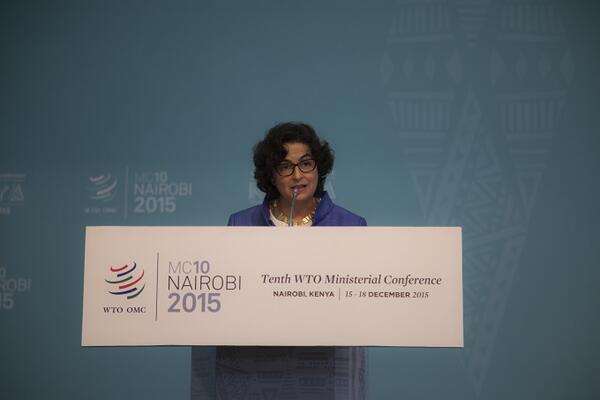
Statement by the Executive Director of the International Trade Centre at the plenary session of the Tenth WTO Ministerial Conference
16 December 2015 - Nairobi, Kenya
Her Excellency Amina Mohamed, Cabinet Secretary, Ministry of Foreign Affairs & International Trade, and Chair of the Ministerial Conference
Honourable Ministers
Director-General Roberto Azevedo
Excellencies
Colleagues
Friends.
Let me start by thanking the government and people of Kenya for hosting Africa’s first WTO ministerial as we celebrate the Organisation's 20th anniversary.
Earlier this week, I visited a tea plantation in Makomboki, outside Nairobi, where ITC is helping tea smallholders adapt to changing climate. Shielding crop yields from climate change is only one step. For higher incomes and expanded opportunities, people there still need to connect to markets abroad.
At a factory that has saved money and cut emissions by switching from firewood to biogas to dry tea leaves, a farmer asked me “Why in Paris but not at the WTO?”
We owe him an answer. In Paris we delivered a deal to cut greenhouse gas emissions- the beginning of a transformation of our economy.
Paris holds some powerful lessons for the comparatively modest task before us here in Nairobi.
It cannot be that the Paris Agreement was politically easier than a deal at the WTO. Cutting fossil fuel subsidies is certainly not easier than cutting trade-distorting farm subsidies.
It cannot be that it is impossible for emerging and developed economies to agree on what constitutes a fair division of responsibilities in the modern world order. In Paris, they – you – did just that.
It cannot be that businesses are motivated about climate change but uninterested in the WTO agenda.
This year, I have met thousands of small and medium-sized enterprises who represent over 70% of all jobs worldwide. And believe me, they want a transparent, predictable, global level playing field. They want more WTO, not less global cooperation.
Yes bilaterals may be easier. But Multilateralism is more effective. Look at the enormous potential gains from the Trade Facilitation Agreement. Do we really believe that the best way to manage the interconnectedness of our economies is by fragmenting the global playing field?
Multilateralism is also more inclusive: it does not leave anyone outside.
We delivered in September with the adoption of the UN Global Goals. And with determination and political will, we can deliver at the WTO, starting here at MC10.
The accession of Afghanistan and Liberia will open new horizons for businesses in both-post-conflict countries. We must build on this and take meaningful steps to expand trade possibilities, particularly for LDCs.
That said, while opening markets and cutting trade costs are indispensable for making trade possible, they are often not enough to make trade happen. This is especially true for women, youth or refugees.
Trade success requires competitive companies with access to the market intelligence, institutional support and networks to break into world markets. To connect to value chains, SMEs must be able to overcome non-tariff measures and meet certification requirements and quality standards.
Well-targeted Aid for Trade investments can catalyse outsized rewards in better jobs, productivity, and competitiveness, building economic resilience that endures long after external support is withdrawn.
One example of this comes from the Nairobi hub of the International Trade Centre's Ethical Fashion Initiative, where private investors are replacing funders without compromising on commercial success or social impact.
To conclude, it is time to revive trade multilateralism. It is time to keep investing in making trade happen, however pressing more immediate needs are. We would be wrong to respond to immediate urgencies by cutting the support that builds the medium to long term resilience of the weakest economies. Our smart investment today, will make for fewer victims in the future.



